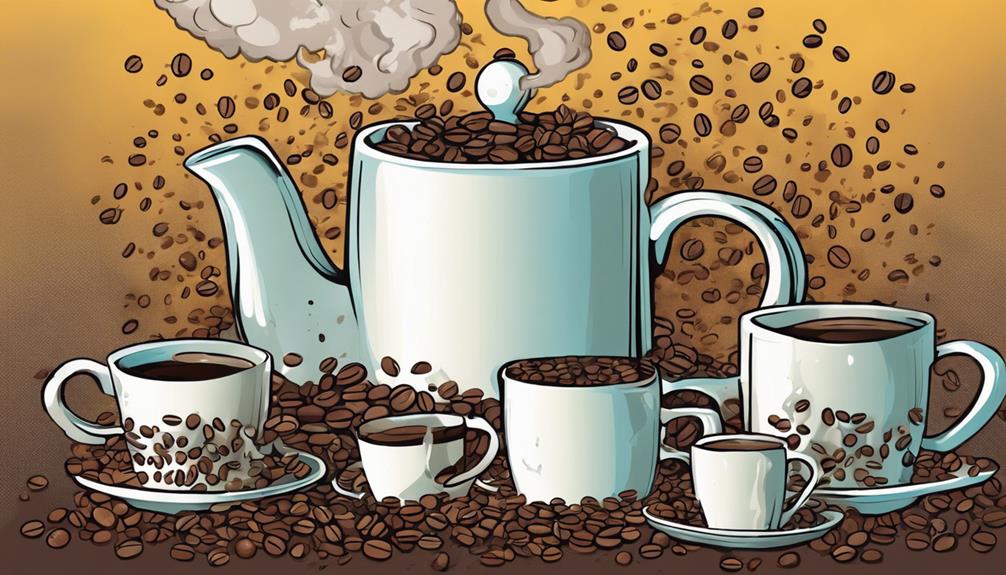Coffee itself does not kill roaches; however, its caffeine content can serve as a natural deterrent. Roaches are believed to be sensitive to the smell of coffee, which can disrupt their pathways and discourage them from areas that smell like coffee. While there is only limited evidence supporting the use of coffee grounds as a repellent, when combined with other pest control methods, it may improve effectiveness. It is important to remember that roaches are primarily attracted to sources of food and moisture, so a comprehensive pest management strategy is crucial. If you are interested in learning more about how coffee can be incorporated into pest control and its long-term effects, additional information is available.
Key Takeaways
- Coffee's caffeine can be toxic to roaches in high doses.
- Roaches may develop tolerance to caffeine over time.
- Coffee grounds' effectiveness in killing roaches is limited.
- Combining coffee with other pest control methods is more effective.
- Professional pest control may be more reliable than using coffee alone.
The Science Behind Coffee and Roaches
Coffee contains caffeine, a substance that can impact roaches in various ways. While coffee grounds do contain caffeine, which is toxic to roaches in high doses, the concentration found in typical coffee grounds is usually not enough to kill them.
Roaches can develop a tolerance to caffeine over time, making it less effective as a roach repellent. The scent of coffee grounds may deter roaches temporarily, but it isn't a reliable long-term solution for roach control.
Despite some beliefs that coffee grounds can eliminate roaches, there's limited scientific evidence supporting this claim. For better results, combining coffee grounds with other proven pest control methods such as cleanliness and sealing entry points is more effective.
Therefore, while coffee grounds may have some impact on roaches, incorporating them into a well-rounded approach to pest management is crucial for optimal results.
Roach Sensitivity to Coffee Aroma
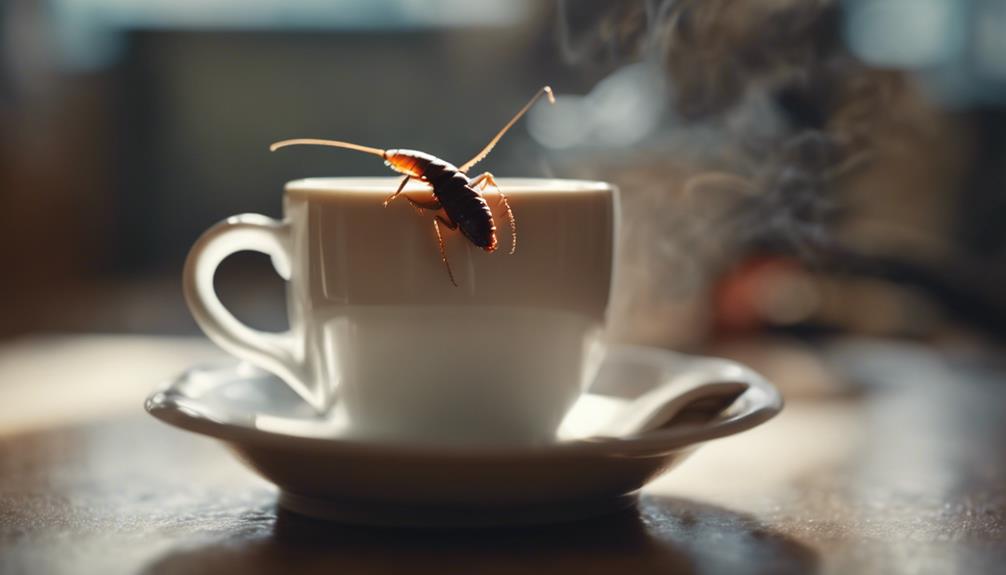
When exposed to the aroma of coffee grounds, roaches display a noticeable change in behavior and movement patterns. The strong scent of coffee disrupts the pheromone trails that roaches rely on for navigation, causing them to become disoriented and less likely to venture into areas with the overwhelming coffee aroma.
While coffee grounds may not directly kill roaches, their sensitive olfactory system makes them avoid places with potent smells like coffee. This sensitivity to coffee aroma serves as a natural deterrent, repelling roaches from invading specific spaces where the scent is present.
It's important to note that the repelling effect of coffee on roaches is due to the scent rather than any toxic properties in the coffee itself. Utilizing the aroma of coffee grounds strategically can help in deterring roaches from certain areas without the need for harmful chemicals or pesticides.
Using Coffee Grounds as Repellent
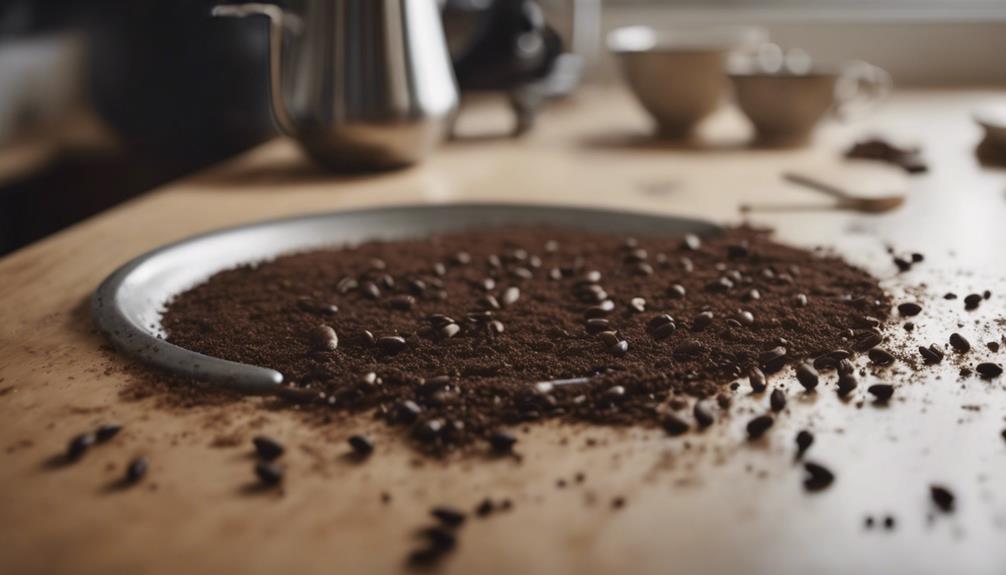
Consider incorporating coffee grounds as part of your pest control strategy to deter roaches naturally.
Some suggest that the strong odor and potential toxicity of coffee grounds can repel roaches.
It's believed that caffeine in coffee grounds might harm roaches by impacting their nervous systems.
However, solely relying on coffee grounds to kill or deter roaches may not offer a lasting solution.
In fact, using excessive amounts of coffee grounds could potentially attract roaches instead of deterring them, leading to unintended consequences.
To effectively manage roaches, it's advisable to combine the use of coffee grounds with other proven pest prevention methods.
For a more all-encompassing approach to cockroach control, consider incorporating professional pest control services if necessary.
Remember that while coffee grounds can play a role in repelling roaches, a holistic strategy is essential for long-term success in managing these unwanted pests.
Effectiveness of Coffee on Roaches

Coffee's effectiveness on roaches is still a topic of debate. While the caffeine in coffee grounds is believed to be toxic to roaches, research on its impact remains inconclusive.
It's important to take into account other pest control methods in conjunction with coffee grounds for a more well-rounded approach to managing roach infestations.
Coffee and Roach Infestation
Coffee grounds' effectiveness in controlling roach infestations is limited due to their low caffeine toxicity and minimal impact on deterring these pests effectively.
Placing coffee grounds around your home may not be a reliable solution for addressing a cockroach problem. Research suggests that compared to proven methods like boric acid or diatomaceous earth, coffee grounds don't have a significant impact on eliminating roaches.
Roaches are primarily attracted to food sources and moisture rather than the scent of coffee grounds, making them less likely to be deterred by this method alone. While some sources advocate for using coffee grounds as a natural roach repellent, their effectiveness in deterring or eradicating roaches is minimal when compared to professional pest control options.
Hence, it's advisable to explore alternative strategies supported by research and experts to effectively manage a roach infestation in your living space.
Coffee Grounds as Repellent
Studies have indicated that the effectiveness of coffee grounds as a repellent for roaches may not be as significant as previously thought. While it was believed that the caffeine in coffee grounds could be toxic to roaches, recent studies have shown that this may not be potent enough to eliminate them. In fact, relying solely on coffee grounds may not be a reliable method for getting rid of a cockroach infestation. It is crucial to take into account combining coffee grounds with other proven pest control methods for better results.
| Misconception | Fact | Explanation |
|---|---|---|
| Coffee grounds repel roaches effectively | Studies show coffee grounds may not repel roaches effectively | The caffeine in coffee grounds might not be potent enough to eliminate roaches |
| Coffee grounds are toxic to roaches | Caffeine in coffee grounds may not be toxic enough to kill roaches | Roaches may not be as affected by caffeine as previously believed |
| Using coffee grounds will deter roaches | Excess coffee grounds can attract roaches | Overusing coffee grounds may have the opposite effect |
Coffee Vs. Other Roach Remedies
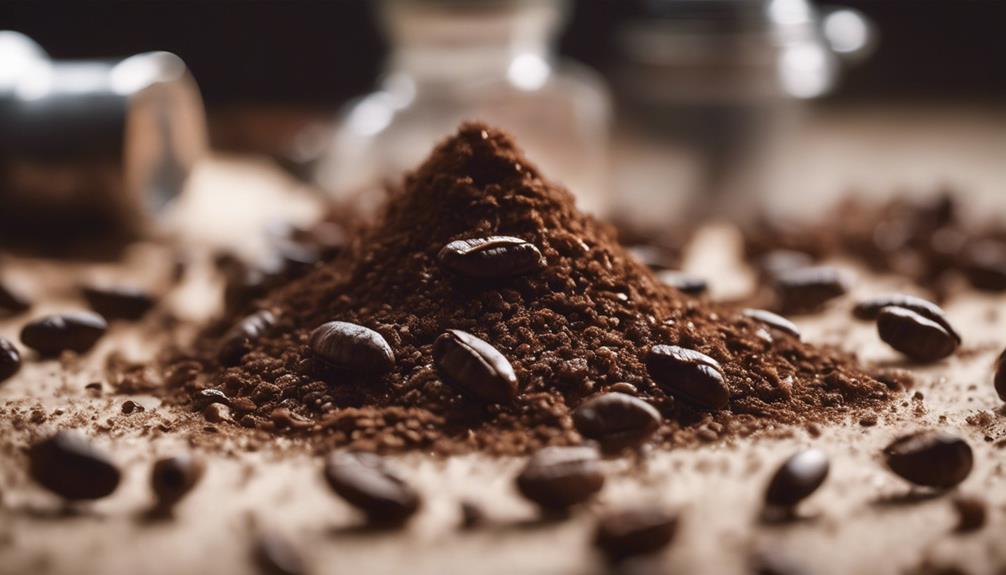
When evaluating coffee as a roach remedy, it's crucial to compare its effectiveness to traditional sprays and other methods.
While coffee may act as a repellent, its impact on roaches mightn't be as reliable or long-lasting as some chemical solutions.
Understanding how coffee measures up against proven roach remedies can help you choose the most effective approach for controlling these pests in your home.
Coffee as Roach Repellent
While coffee grounds are commonly considered as a potential roach repellent, they may not be as effective as other proven remedies like boric acid or diatomaceous earth. Coffee grounds have not been scientifically proven to effectively kill or repel roaches. The caffeine in coffee grounds is believed to be toxic to roaches, but not in high enough concentrations to be lethal. When compared to boric acid and diatomaceous earth, which have demonstrated roach-repelling properties, using coffee grounds alone may have limited effectiveness. It is essential to combine coffee grounds with other preventative measures such as sealing entry points, removing food sources, and maintaining cleanliness for better roach control.
| Aspect | Coffee Grounds | Boric Acid | Diatomaceous Earth |
|---|---|---|---|
| Effectiveness | Limited | High | High |
| Toxicity to Roaches | Low | Moderate | Low |
| Scientific Evidence | Limited | Proven | Proven |
| Ease of Use | Easy | Moderate | Easy |
Effectiveness Compared to Sprays
Coffee grounds may not be as effective as chemical sprays or boric acid in killing roaches. When comparing the efficacy of coffee grounds to traditional roach remedies, it becomes evident that chemical sprays offer a more reliable solution.
Here are some key points to ponder in this comparison:
- Scientific Evidence: Unlike chemical sprays and boric acid, coffee grounds lack scientific backing for their ability to effectively eliminate roaches.
- Toxicity Levels: The caffeine content in coffee grounds is insufficiently toxic to eradicate roaches, making them less potent than commercial pesticides.
- Repellent vs. Lethal: While coffee grounds may act as a repellent due to their strong aroma, they fall short in their ability to deliver lethal effects on roaches.
- Success Rate: Chemical sprays, particularly boric acid, have demonstrated a higher success rate in exterminating roaches compared to the use of coffee grounds.
When faced with a roach infestation, opting for proven solutions like chemical sprays can yield more effective results than relying on coffee grounds.
Long-Term Impact on Roaches
For a lasting solution to roach infestations, proven remedies like boric acid have demonstrated more significant and long-lasting effects compared to coffee grounds. While coffee may temporarily impact roaches, its effectiveness wanes over time due to the caffeine not being potent enough to eliminate or deter roaches effectively.
On the other hand, boric acid is a tried-and-tested method that has shown robust and lasting results in controlling roach populations. Boric acid works by dehydrating the roaches, ultimately leading to their demise. This chemical compound proves to be more resilient in its impact on roaches, making it a preferred choice for long-term roach control.
Unlike coffee grounds, which may only offer temporary relief, boric acid continues to work over an extended period, providing a more sustainable solution to roach infestations. Hence, when aiming for lasting effects and effective roach management, opting for boric acid over coffee grounds is the recommended approach.
Caffeine Toxicity for Roaches
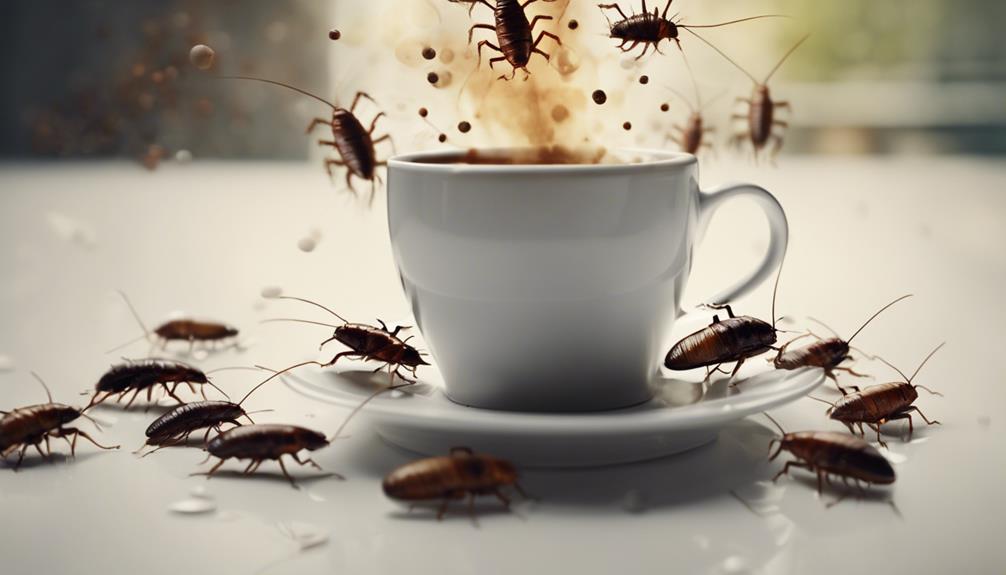
Caffeine toxicity in roaches can be detrimental to their nervous system and behavior. When considering the impact of caffeine on these pests, it's crucial to understand the following:
- Toxic Effects: High concentrations of caffeine can disrupt roaches' nervous systems, leading to erratic behavior and potential paralysis.
- Repellent Properties: Roaches may actively avoid areas with elevated levels of caffeine, perceiving it as a threat or danger.
- Dehydration and Fatality: Excessive consumption of caffeine can cause dehydration in roaches, ultimately resulting in their demise.
- Varied Results: While caffeine toxicity can affect roaches, its effectiveness as a sole method for pest control may vary based on factors such as concentration and exposure duration.
Considering these factors, utilizing caffeine as a pest control method against roaches should be approached with caution and in conjunction with other strategies for the best outcomes.
Integrating Coffee in Pest Control
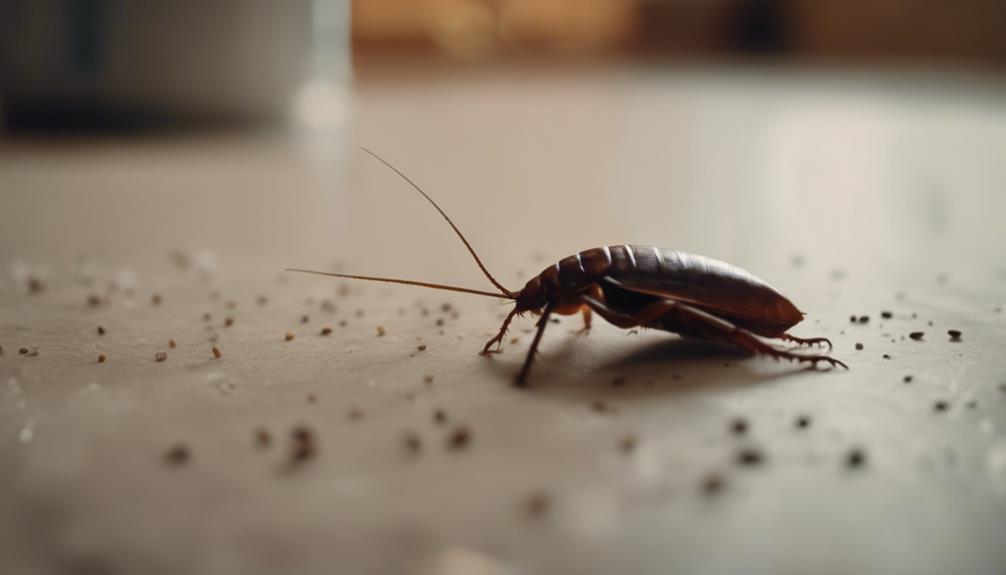
Considering the potential toxicity of coffee grounds to roaches and their repellent properties, integrating coffee in pest control strategies can offer an effective approach to deterring these pests.
When using coffee grounds as part of your pest control plan, it's vital to target common entry points where roaches can infiltrate your home. Make sure that cracks in walls, gaps around pipes, and openings near doors and windows are properly sealed to prevent roaches from entering. By combining the use of coffee grounds with sealing these entry points, you create a more thorough defense against roaches.
Additionally, maintaining cleanliness in your living spaces is essential to complement the effects of coffee grounds. Roaches are attracted to food residue and moisture, so keeping areas free of crumbs and standing water can further discourage their presence.
For enhanced results, consider mixing coffee grounds with substances like boric acid or diatomaceous earth to create a more all-encompassing approach to roach control.
Tips for Applying Coffee as a Deterrent
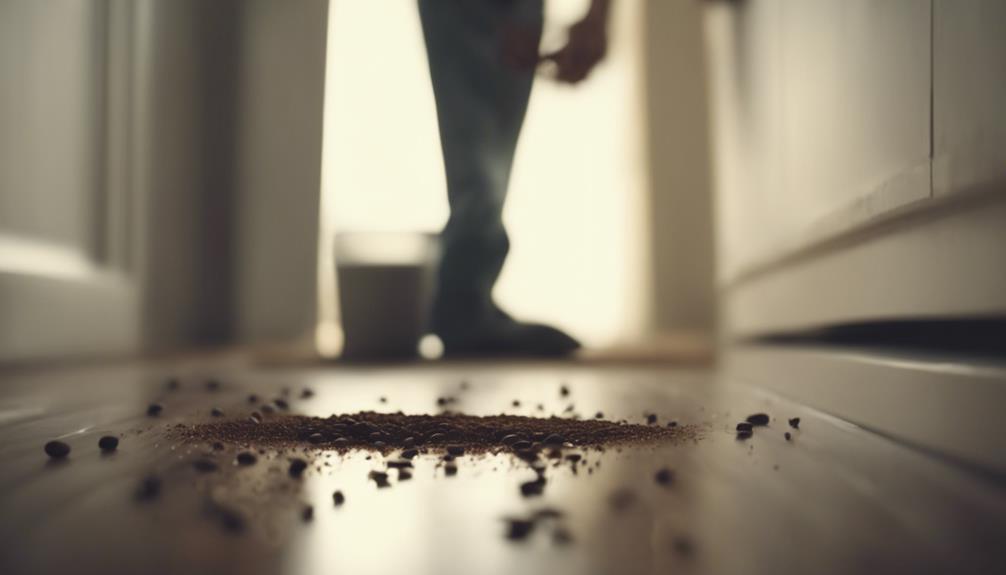
To effectively deter roaches using coffee grounds, strategically sprinkle them near entry points in your home. Consider the following tips for applying coffee grounds as a deterrent:
- Thorough Placement: Place coffee grounds near doors, windows, and any other potential entry points for roaches to create a barrier that may deter them from entering your home.
- Combination with Other Methods: Enhance the effectiveness of coffee grounds by combining them with other preventive measures such as decluttering your living spaces and storing food in sealed containers to eliminate attractants for roaches.
- Moderation is Key: Remember that excessive amounts of coffee grounds may actually attract roaches instead of repelling them, so use them sparingly and in targeted areas.
- Seek Professional Advice: If using coffee grounds alone doesn't yield the desired results, consider consulting with pest control professionals for more detailed solutions tailored to your specific roach infestation.
Coffee Grounds as a Preventative Measure
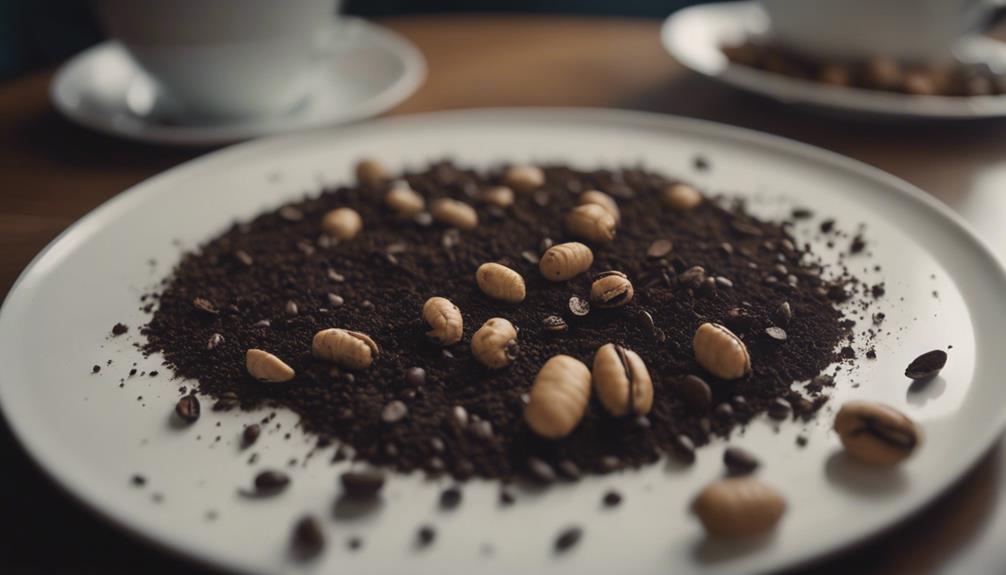
Using coffee grounds as a preventive measure against roaches can be an effective strategy due to their strong scent and potential toxicity to insects. Placing coffee grounds strategically around areas where roaches are likely to enter, such as near entry points or in dark corners, may help deter these pests. The caffeine in coffee grounds is believed to have a toxic effect on roaches, impacting their nervous system and behavior. However, it's important to note that while coffee grounds can repel roaches to some extent, relying solely on this method for roach control may not be entirely effective.
To maximize the benefits of using coffee grounds, make sure they're cleaned up promptly after use to avoid inadvertently attracting roaches with excess grounds. Additionally, combining the use of coffee grounds with other preventive measures like sealing cracks, crevices, and entry points, as well as maintaining cleanliness in your living spaces, can enhance the overall effectiveness in keeping roaches at bay.
Frequently Asked Questions
Is Coffee Good to Kill Roaches?
Using coffee grounds to kill roaches isn't very effective. Roaches aren't greatly affected by coffee's caffeine content.
In fact, excessive coffee grounds might attract roaches, potentially causing an infestation.
It's best to rely on proven pest control methods and seek professional help for roach elimination.
To control roaches, focus on sealing entry points, maintaining cleanliness, and employing targeted pest control strategies.
Avoid using coffee grounds as a roach-killing method.
How to Use Coffee Grounds to Get Rid of Cockroaches?
To use coffee grounds to deter cockroaches, sprinkle them near entry points, as some believe the caffeine repels the pests.
Combine this approach with decluttering and food storage in airtight containers for better results.
However, be cautious as excess coffee grounds could attract roaches if not cleaned promptly.
Understand that scientific evidence on the effectiveness of coffee grounds is inconclusive.
For thorough pest control, consult professionals if coffee grounds alone are insufficient.
What Is the Best Homemade Roach Killer?
When looking for the best homemade roach killer, consider boric acid mixed with sugar for disrupting roaches' digestive systems.
Diatomaceous earth is effective by causing abrasions to their exoskeletons.
Baking soda combined with sugar acts as a natural pesticide.
Cucumber slices can work as a repellent.
Soaps and detergents are potent against adult German cockroaches.
These methods offer diverse approaches to combatting roaches effectively in your home.
What Smell Do Roaches Hate the Most?
Roaches have a strong aversion to various scents that can effectively repel them from your home. Essential oils like peppermint, lavender, and eucalyptus, as well as citrus scents from lemon, orange, and grapefruit, are known to deter roaches.
Additionally, strong odors such as vinegar, ammonia, cedar, bay leaves, garlic, cucumber, and even coffee grounds can create an inhospitable environment for roaches, keeping them away.
Conclusion
Contrary to popular belief, coffee doesn't actually kill roaches. While it may repel them due to its strong aroma, the idea of coffee being a lethal weapon against these pests is simply a myth. In fact, there are natural remedies that are more effective in getting rid of roaches, such as boric acid and diatomaceous earth. Additionally, some people have found success in using chickens and coffee grounds to ward off roaches. While caffeine may be a deterrent for roaches, it definitely won’t be their downfall.
So, don't rely on your morning brew to rid your home of roaches completely. Instead, use it as a deterrent alongside other proven methods for effective pest control.
Remember, coffee may wake you up, but it won't be putting roaches to sleep anytime soon.



